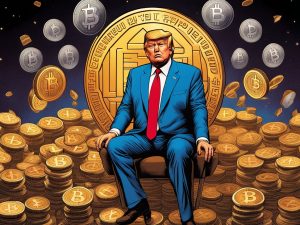Insights Into South Korea’s Cryptocurrency Landscape 📊
The dynamics of cryptocurrency regulations and market behaviors are shaping up significantly in South Korea. Recent insights reveal the challenges faced by domestic exchanges, the flow of capital, and the need for potential reforms. This year is critical for understanding the evolving landscape and how it might affect investors and market participants alike.
The Challenge of Tight Regulations 🚧
According to Lee, a prominent lawmaker, the stringent regulations currently governing the South Korean cryptocurrency market are hindering the inflow of foreign investments. He emphasized that these rules are effectively “blocking funds” from entering the country, which could stifle growth and innovation within the domestic crypto exchange ecosystem.
Lee noted that there exists a troubling trend wherein a substantial amount of capital, estimated in “trillions” of Korean won annually, is flowing from local trading platforms to offshore exchanges. This one-way movement raises alarms about the competitiveness and appeal of South Korean exchanges.
- Key observations from Lee include:
- Minimal instances of funds returning to South Korean platforms.
- A significant imbalance in capital flow, which poses systemic risks and may hinder local market development.
- The need for proactive measures to enhance the attractiveness of the domestic market.
The Implications for Domestic Exchanges 🔍
This situation calls for immediate attention since it reflects deeper systemic issues within the South Korean crypto sector. Recent discussions among lawmakers have spotlighted companies like Upbit and raised concerns regarding their potential dominance in the market. Such monopolistic behaviors could undermine fair competition and innovation.
Interestingly, this isn’t just a recent development; earlier this year, several members from the Democratic Party echoed similar sentiments about Upbit’s prominent stance in the market. The ongoing scrutiny suggests a governmental inclination toward imposing further regulations to balance market activities.
During these deliberations, Lee pointed out a striking fact: the lack of instances where capital flows from international exchanges back to South Korean platforms continues to be a pressing concern. He stressed that resolving these issues is pivotal to fostering a healthier crypto ecosystem.
The Need for Change 🛠️
As the landscape evolves, it becomes crucial for stakeholders—including policymakers and industry leaders—to engage in constructive dialogue aimed at reforming the existing regulatory framework. A more balanced approach could pave the way for increased foreign investment and a revitalization of domestic exchanges.
- Potential strategies to enhance the local market include:
- Implementing favorable regulations to attract foreign capital.
- Fostering collaboration between domestic and international exchanges.
- Encouraging transparency and compliance to build trust among investors.
Furthermore, innovative measures will be essential to reinvigorate consumer confidence and stimulate local trading activities. With the appropriate adjustments, South Korea can potentially become a global hub for cryptocurrency innovation.
Hot Take: The Road Ahead for South Korea’s Crypto Market 🔮
In summary, South Korea’s cryptocurrency market stands at a crossroads this year. The call for regulatory reforms and strategic shifts by lawmakers like Lee signals a desire for one that fosters growth, innovation, and global competitiveness. By addressing the imbalance in capital flow and potential monopolistic tendencies, South Korea can carve out a competitive niche within the global cryptocurrency landscape.
The next steps hinge on the collaborative efforts between regulators, industry players, and investors to create a more inviting and balanced market that safeguards both domestic and foreign interests. Embracing change may lead to a more prosperous future for cryptocurrency in South Korea.





 By
By
 By
By
 By
By

